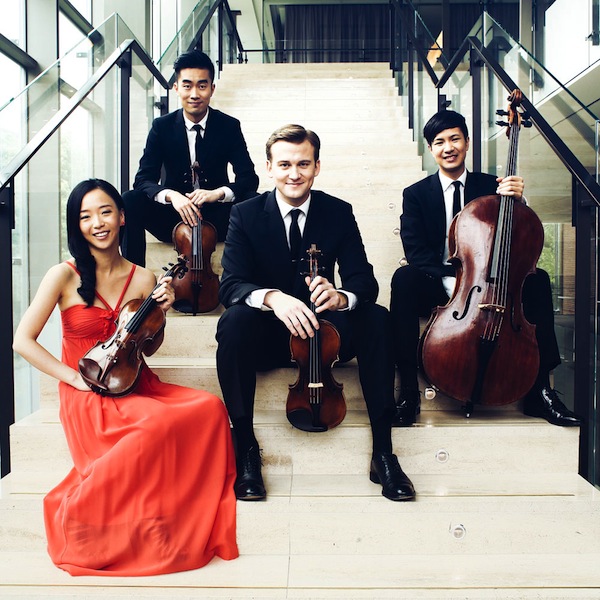Rolston Quartet makes a refined debut at Winter Chamber Music Festival
The Winter Chamber Music Festival in Evanston has justly earned kudos for curating interesting programs deftly executed by a mix of local and visiting performers. This year they scored something of a coup with the debuts of two promising young string quartets. The Dudok Kwartek Amsterdam made an impressive showing Friday in their American debut, and Sunday at Pick-Staiger Concert Hall at Northwestern University the Rolston String Quartet paid their first visit to the Chicago area.
The Canadian foursome seem to be following a parallel career path with the Dover Quartet, the Bienen School of Music’s quartet-in-residence (slated for their own appearance at the festival January 26). Like the Dover Quartet–which rose to prominence with a victory at the 2013 Banff Competition–the Rolston Quartet nabbed the same prize in 2016. For their concerts at this festival, all three ensembles chose program openers from Mozart’s set of six quartets dedicated to Haydn, the first master of the idiom.
From the opening bars of the first movement of the Quartet in A major, K. 464, the ensemble demonstrated near-flawless technical precision, with clean, cushioned articulation and unfailing unanimity of expression. Reading from matching iPads, they took pains to emphasize elegance and refinement above all other virtues, a strategy that mostly succeeded in the opening Allegro. Vibrato was applied judiciously, and was occasionally avoided entirely, most notably in Mozart’s mildly dissonant suspensions.
The Minuet unfolded with care lavished on the composer’s asymmetric phrase structures, and subtle rubato gently illuminated each melodic fragment. But the reading underlined elegance at the expense of other attributes, including the composer’s occasional flashes of dark humor and the dance lineage of the idiom.
First violinist Luri Lee’s sweet-toned reading of the theme of the third movement held a winning charm, but some of the following variations worked better than others. The minor key variation was wanting in dramatic intensity, and the signature “drum” variant initiated by cellist Jonathan Lo lacked percussive bite. The finale was better, the quartet’s unwavering transparency working wonders on Mozart’s ingenious counterpoint.
Tchaikovsky’s String Quartet No. 1 was similarly exacting in execution, and filled with expressive touches that reflected the young players’ intellectual engagement with this romantic warhorse. The shimmering opening chords of the first movement bloomed with an organ-like sonority, and the final accelerando worked up a bracing head of steam. A highlight was the famous second movement Andante cantabile, spun as an intimate, lyrical lullaby.
The quartet dug deep for a more extroverted Scherzo, but fell short of the kind of abandon that the best performances of the movement feature. Their aura of invincibility dimmed a bit with some shaky violin octaves in the finale, but the coda was vivid and hot-blooded.
With 12 string quartets to his credit, few Canadian composers have devoted themselves to the idiom with such consistency as R. Murray Schafer. The Rolston Quartet has little contemporary music in its repertoire to date, but they could do worse than turn their attention to the works of their esteemed compatriot.
His String Quartet No. 2 (“Waves”) from 1976 is a 17-minute sonic depiction of sea water, constructed in a succession of bars lasting between 6 and 11 seconds, the temporal distance between successive crests of waves. The language is pervasively atonal, with a heavy emphasis on brief motives that are continuously repeated and varied. There are suggestions of the string writing of Berg, Bartók, and Ligeti, but the language is very much Schafer’s own.
The young players made ardent champions of the piece, placing the dazzling colors and modulating tempos in high relief. There was a bit of theater involved, with a spotlight on the players and dimmed lighting in the hall (inexplicably retained in the Tchaikovsky).
In the final minutes Lee, second violinist Jeffrey Dyrda and violist Hezekiah Leung slowly walked off the stage one-by-one, a la Haydn’s “Farewell” Symphony, playing motives that eventually settled back stage into a unison doldrum. The cellist was left alone, with solitary whistles intoned with mournful bowed utterances. On paper this may seem gimmicky, but the imaginative scoring and the Rolston’s committed advocacy were a winning combination that made it work.
The Winter Chamber Music Festival continues 7:30 p.m. Friday at Pick-Staiger Hall with music of Tartini, Bartók and Stravinsky. events.music.northwestern.edu
Posted in Uncategorized






Posted Jan 19, 2018 at 1:10 pm by Tyler Dahl
Went to this performance and got to say that it was absolutely dazzling. Tchaikovsky was my favorite but I am a little biased from my music professor’s obsession with Tchaikovsky. Really good performance.